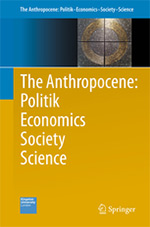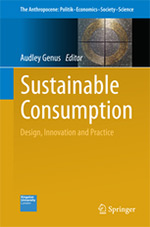
The Anthropocene
Politik – Economics – Society – Science (APESS))
Edited by
Hans Günter Brauch,
AFES-PRESS, chairman
Free University of Berlin (Ret.)
A Peer Reviewed Book Series
ISSN: (Print)
ISSN: (Online)
APESS
Vol 3 |
Audley Genus (Ed.): Sustainable Consumption: Design, Innovation and Practice (Cham-Heidelberg - New York - Dordrecht - London: Springer- Springer International Publishing, 2016).
ISBN : 978-3-319-29663-0 (Print)
ISBN : 978-3-319-29665-4 (Online)
Doi: 978-3-319-29665-4 (add chapter no.)
Order this book on Springer Website |

|
| |
|
|
On this Book
The book originates from the work of contributors to initiatives and global networks promoting and pursuing lines of enquiry that recognise and probe relationships among sustainable consumption, design and production, and the implications of these for new economic activity and the way we live and govern ourselves. The book features contributions from social scientists (e.g. from innovation studies, marketing, social psychology, sustainable design, and sociology) and practitioners to generate a short-list of research perspectives and topics around which future research and actions in practice should be orientated. There are eight contributory chapters plus an Introduction and Conclusion (on policy, research and practical implications). Chapters cover: perspectives/methodological insights; empirical work integrating consumption and production; site-specific case studies; and reflections on initiatives in practice.
This book offers a:
-
holistic treatment of sustainable consumption and production (and thus leads to better appreciation of the range of issues to be confronted in properly understanding and achieving sustainable economies and societies);
-
presents new perspectives on the issues (helps readers to think about sustainable consumption/production in novel ways); and
-
unusually spans theory, empirical research, action initiatives and policy implications.
Contents
-
Audley Genus and Ann Thorpe: Introduction
-
Giuseppe Salvia and Tim Cooper: The Role of Design as a Catalyst for Sustainable DIY
-
Laura Piscicelli, Mariale Moreno, Tim Cooper and Tom Fisher: The Individual-Practice Framework: a Design tool for Understanding Consumer Behaviour
-
Athena Piterou and Fred Steward: From Print to Digital: Textual Technologies and Reading as a Sociotechnical Practice
-
Sarah Netter Availability Cascades and the Sharing Economy: A Critique of Sharing Economy Narratives
-
Claudia E. Henninger, Panayiota J. Alevizou, Caroline J. Oates and Ranis Cheng. Communicating Sustainability: the case of Slow-Fashion Micro-Organisations
-
Steven R. McGreevy and Motoki Akitsu Steering Sustainable Food Consumption in Japan: Trust, Relationships, and the Ties that Bind
-
Anne-Marie Coles. The Potential for Sustainable Production and Consumption in a Technological Society
-
Mandy Meikle. Promoting Sustainable Consumption - a View from the Ground
-
Audley Genus. Conclusion
On the Editor
 |
Audley Genus (UK), Professor at the Small Business Research Centre, Kingston University, Kingston upon Thames, has research interests in the areas of innovation and entrepreneurship, technology policy and sustainable consumption and production. He publishes regularly in high impact journals such as Research Policy, Applied Energy and Environment and Planning and has published three single-authored books. He is a member of the editorial board of Technology Analysis and Strategic Management and the steering committee of the Sustainable Consumption Research and Action Initiative (SCORAI) Europe. Audley is a member of the European Association for the Study of Science and Technology (EASST), the British Academy of Management, the Sustainable Development Research Network and the Sustainability Transitions Research Network.
Selected publications: M Coles, Piterou, A., and Genus, A. (in press). Sustainable energy projects and the community: mapping single building use of microgeneration technologies in London, Urban Studies; Genus, A., and Theobald, K. (in press). Roles for University Researchers in Urban Sustainability Initiatives: the UK Newcastle Low Carbon Neighbourhoods project, Journal of Cleaner Production; Genus, A., and Theobald, K. (in press). Creating Low Carbon Neighbourhoods: a Critical Discourse Analysis, European Urban and Regional Studies; Attar, A., and Genus, A. (2014) Framing Public Engagement: a Critical Discourse Analysis of GM Nation? Technological Forecasting and Social Change 88: 241-250; Genus, A. (2014) ‘Co-inquiry’ for Environmental Sustainability: a Review of the UK Beacons for Public Engagement, Environment and Planning C: Government and Policy 32(3): 491-508; Genus, A., and Mafakheri, F. (2014). A Neo-institutional Perspective of Supply Chains and Energy Security: the Case of Bioenergy, Applied Energy 123: 307-315; Genus, A. (2014). Governing Sustainability: A Discourse-Institutional Approach, Sustainability 6(1): 283-305; Genus, A. (2012). Changing the Rules? Institutional Innovation and the Diffusion of Microgeneration, Technology Analysis and Strategic Management, 24(7): 711-727; Genus, A., and Coles, A-M. (2008). Rethinking the Multi-level Perspective of Technological Transitions, Research Policy 37(9): 1436-1445.
|
On the Contributors
Motoki Akitsu (Japan), is Professor of Philosophy of Agricultural Science in the Graduate School of Agriculture at Kyoto University and working as a council member on several domestic and international academic associations. He has been studying cultural construction and social problems in rural societies not only in Japan, but also in Asian, African, and European countries. He has recently begun research projects on the promotion of ethical food consumption in Japan and Asian countries to support the creation of sustainable agrifood systems.
Panayiota J. Alevizou (UK), is a Lecturer in Marketing at the University of Sheffield Management School, where she teaches contemporary marketing management and retail & services marketing. Her research focuses on sustainability labeling, eco-labeling, and ethical marketing in the context of fast-moving consumer goods and apparel. She has presented her work in various national and international conferences and has published in journals such as Journal of Marketing Management, Journal of Marketing Communications, and the International Journal of Consumer Studies.
Ranis Cheng (UK), is a Lecturer in Marketing at the Management School, University of Sheffield. She obtained her PhD from Manchester Metropolitan University. Her doctoral thesis explored the desired and perceived corporate identity within the UK fast fashion retail sector. Her research interests are corporate identity and corporate brand management. She is a member of Chartered Institute of Marketing. She has published in the European Journal of Marketing and Journal of Product and Brand Management.
Anne-Marie Coles (UK), is Senior Lecturer in Strategic Management in the Faculty of Business, Greenwich University and currently leader of the Sustainability, Technology and Innovation Research (STIR) group. Her research is concerned with elucidation of the complex, dynamic factors that affect development of new artefacts, their subsequent diffusion and use. Anne-Marie’s analytical approach is to examine the social embedding of technologies through reconfiguration of heterogeneous socio-technical networks. Specific themes are: non-linear socio-technical path creation; development and adoption of sustainable technologies; and knowledge-based small firms.
Tim Cooper (UK), is Professor of Sustainable Design and Consumption at Nottingham Trent University and Co-Director of the Centre for Industrial Energy, Materials and Products. A specialist in product lifetimes, his research interests are multidisciplinary, embracing sustainable design, consumer behaviour, public policy and environmental values. His work has been funded by the European Commission, EPSRC, Defra and WRAP and has included collaborative projects with industry in the clothing and electronic goods sectors. He is Contributing Editor of Longer Lasting Products (Gower, 2010)
Tom Fisher (UK), is Professor of Art and Design at Nottingham Trent University UK. A graduate in Fine Art he has worked as a designer and maker of furniture, and wrote his PhD in the Sociology department at the University of York that concentrated on everyday experiences of plastic materials. His current research focuses on the materiality of human/ object relationships and their implications for sustainability. In this he draws on his background as a maker and on perspectives from the sociology of consumption.
Claudia Henninger (UK), is Lecturer in Fashion Marketing Management, School of Materials, University of Manchester, where she teaches aspects of branding. Her research focuses on sustainability in the fashion industry, corporate identity, micro-organisations, and value co-creation. Claudia has been involved in a variety of projects in the area of sustainability marketing and the creative and cultural industries. Her work has been presented at both national and international conferences and she has published in the area of marketing and management.
Steven R. McGreevy (Japan), is an Assistant Professor at the Research Institute for Humanity and Nature (RIHN) and has a background in agriculture and rural sustainable development from Kyoto University (PhD, 2012). His research focuses on novel approaches to rural revitalization utilizing local natural resources and the relinking of patterns of food consumption and production at local communities in Japan. He leads a RIHN Feasibility Study entitled “Lifeworlds of Sustainable Food Consumption and Production: Agrifood Systems in Transition” exploring the transformation of social practices related to food and agriculture at various sites in Asia.
Mandy Meikle (UK), Woolfords, Auchengray and Tarbrax Improvement Foundation (WATIF), South Lanarkshire, Scotland, UK, has been speaking on peak oil issues since 2004. She is an environmental and community activist working with the WATIF community trust in South Lanarkshire in Scotland. Mandy also edits the Reforesting Scotland Journal and undertakes both independent and contract research on climate justice.
Mariale Moreno (UK), is a Research Fellow at the RECODE Network at Cranfield University. She has collaborated at the Centre for Industrial Energy, Material and Products; an EUED inter-university research project between industry and academic partners looking at reducing materials and energy demand. Her work focuses on user-centred design, consumer behaviour, sustainable production and consumption, and business opportunities towards achieving a Circular Economy. She completed her PhD at Loughborough University on user-centred design and sustainable consumption
Sarah Netter (Denmark), is a PhD Fellow at the Centre for Corporate Social Responsibility in the Copenhagen Business School and is also affiliated with the MISTRA Future Fashion Program. She is researching the diffusion of sustainable innovations and the adoption of sustainable fashion consumption practices. Sarah’s work examines young consumers’ acceptance of innovative forms of sustainable fashion consumption by investigating cases of in-store recycling systems and collaborative fashion consumption.
Caroline J. Oates (UK), is a Senior Lecturer in Marketing at the University of Sheffield Management School, where she teaches marketing communications and directs the Postgraduate Research Programme. Her research focuses on ethical issues and challenges in marketing, particularly sustainability and marketing to children. She has published widely in both these fields, in journals such as Psychology & Marketing, Sociology, Journal of Marketing Management, Social Business, and Young Consumers. She is the co-author/co-editor of two books on advertising to children.
Laura Piscicelli (UK), is a PhD candidate in Sustainable Consumption at Nottingham Trent University. She holds an MSc in Product-Service System Design and a BSc in Industrial Design from Politecnico di Milano. Her current research combines insights from social psychology and social practice theory to understand the role of values in the acceptance, adoption and diffusion of collaborative consumption. Laura’s research interests are in the areas of design and sustainability, including consumer behaviour, design for behaviour change, product-service systems, user-centred design and the collaborative economy.
Athena Piterou (UK), is Lecturer in Sustainability at the University of Greenwich. She has completed her PhD at Brunel University. The thesis examined the development of electronic books as a disruptive innovation and implications for print-on-paper sustainability. She is a Visiting Fellow at the Policy Studies Institute, University of Westminster where she produced a network analysis of the events organised by the Sustainable Development Research Network. Her research follows a relational approach to innovation and applies social network analysis methods to the examination of hybrid networks. This method was developed to map sustainable energy technologies in London.
Giuseppe Salvia (Italy), is a Research Fellow at Politecnico di Milano where he investigates the current self-producing and making trend (i.e. DIY) with a focus on grassroot innovations and development of skills. Giuseppe is interested in the design role in a society where “everyone designs” in order to foster sustainable consumption and production. His PhD research investigated the satisfactory component of potentially sustainable practices, as individual and collaborative making and transforming. He has also collaborated in research projects on product longevity, design strategies for sustainable consumption, industrial ecology and life cycle assessment, bio-inspired design approaches, materials innovation, and expressive-sensorial dimensions of materials.
Fred Steward (UK), is Professor of Innovation and Sustainability at the Policy Studies Institute. His research interest is in ‘transformative innovation’- pervasive, radical, system-wide social and technological change. His approach to this is a synthesis between innovation network concepts and sociotechnical transition theory. The focus of his research is the role of innovation in addressing the global challenge of climate change and environmental sustainability, and the implications of this for policy. He is a member of several international committees: the Dutch Knowledge & System Innovation programme, the Sustainable Consumption Research network, the IHDP Industrial Transformation programme, and of the Royal Society committee on Global Environmental Change.
Ann Thorpe (UK), University College London, is interested in sustainable design and the spatial and material politics that surround it. Ann has published a number of papers and two books, The Designers Atlas of Sustainability and Architecture and also Design versus Consumerism. Her work examines design’s role in sustainable consumption, activism, and innovation, particularly moving from reformist to transformative policies. Ann has lectured internationally on these topics and audiences describe her accessible and generously illustrated talks as “brain-opening,” “intriguing and insightful,” and full of “unusual angles.”

On Kingston University London
Kingston University is the largest higher education provider in South West London, with nearly 21,000 students enrolled on full and part-time courses. Its four campuses are located within a four-mile radius of the Kingston upon Thames town centre, which is 25 minutes from central London.
Kingston University consistently ranks among the top institutions for student applications, is a growing force in research and a pioneer in entrepreneurship and e-learning.
Offering a comprehensive range of undergraduate and postgraduate study programmes, Kingston University provides students with a choice of subjects reflecting their interests and the needs of industry. It is committed to opening up higher education to the whole community and encouraging students from under-represented and disadvantaged backgrounds to further their studies. One in 10 Kingston University students comes from a family with no previous involvement in university study.
Research plays a central role in the University activity. Through a variety of individual cutting-edge projects and the development of multi-disciplinary centres of research excellence, the University has made significant strides in creating a broad range of industry-acclaimed research. Kingston University received a huge boost to its research as a result of the Government’s latest research evaluation exercise – the Research Excellence Framework 2014 – with sixty per cent of its research being rated as world-leading and internationally excellent.
Kingston University plays an active role in nurturing innovation and enterprise. By producing applied research, developing technology transfer and sharing knowledge it has become a driving force in forging strong links between education and the business community.
The Higher Education Business and Community Interaction Survey 2013-14 reported that, for the 6th year running, Kingston was one of the top universities in the country for the number of graduates starting up their own companies. The University also has impressive graduate start-up turnover, with firms launched by former students notching up a combined total of nearly £30 million in 2013-14.
Developments in teaching, learning, research and facilities have all contributed to positioning Kingston University at the heart of education and economic development in the region.
As at January 2015, the estimated annual expenditure stimulated by Kingston University in the regional economy was £481 million.
For more information: <www.kingston.ac.uk>